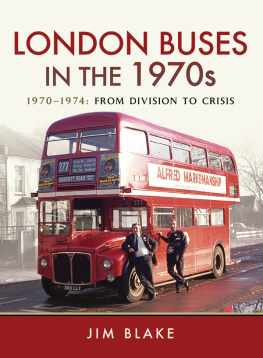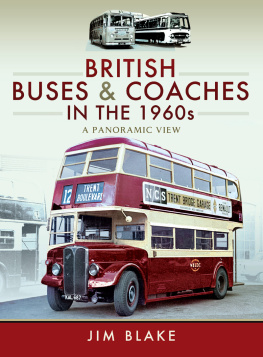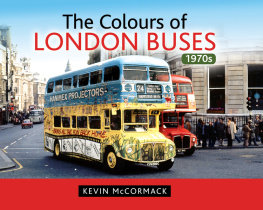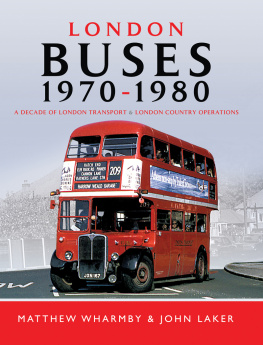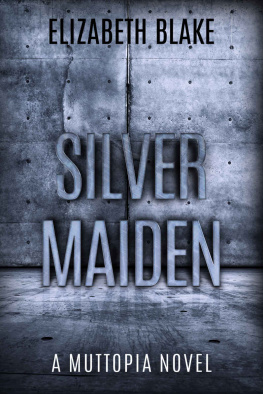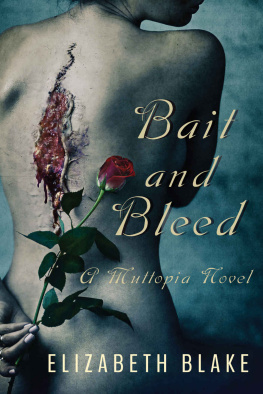Blake Jim - London Buses in the 1970s
Here you can read online Blake Jim - London Buses in the 1970s full text of the book (entire story) in english for free. Download pdf and epub, get meaning, cover and reviews about this ebook. year: 2018, publisher: Pen & Sword Books, genre: Religion. Description of the work, (preface) as well as reviews are available. Best literature library LitArk.com created for fans of good reading and offers a wide selection of genres:
Romance novel
Science fiction
Adventure
Detective
Science
History
Home and family
Prose
Art
Politics
Computer
Non-fiction
Religion
Business
Children
Humor
Choose a favorite category and find really read worthwhile books. Enjoy immersion in the world of imagination, feel the emotions of the characters or learn something new for yourself, make an fascinating discovery.
London Buses in the 1970s: summary, description and annotation
We offer to read an annotation, description, summary or preface (depends on what the author of the book "London Buses in the 1970s" wrote himself). If you haven't found the necessary information about the book — write in the comments, we will try to find it.
London Buses in the 1970s — read online for free the complete book (whole text) full work
Below is the text of the book, divided by pages. System saving the place of the last page read, allows you to conveniently read the book "London Buses in the 1970s" online for free, without having to search again every time where you left off. Put a bookmark, and you can go to the page where you finished reading at any time.
Font size:
Interval:
Bookmark:

LONDON BUSES IN THE 1970s
19701974: FROM DIVISION TO CRISIS
19701974: FROM DIVISION TO CRISIS
JIM BLAKE

COVER PHOTO:
Autumn leaves fall around Clapton Garages recently-overhauled RM1393 and its crew on 9 November 1974. Things are not what they seem, however, as Clapton RMs never worked route 277, which had converted to DMS the previous January anyway! It is really on route 22 at its Putney Common terminus, and the photo was taken to illustrate how some Clapton RMs had full blind displays for the 277.
The driver is the late Bert Barlow, and the conductor is myself!
REAR COVER PHOTO, TOP:
Typifying the older vehicles that were the backbone of both London bus fleets in the first half of the 1970s, Sidcup RT822 keels over as it turns from Bexley Road into Avery Hill Road on route 228 in the evening rush hour of 1 September 1972.
REAR COVER PHOTO, BOTTOM:
An oddity to appear at this time was Seven Kings RT4353, which emerged from intermediate repaint at Aldenham bearing the registration NLE518 instead of instead of NLP518. On 15 February 1970, the late John Boylett of the PSV Circle organised a trip to Grays Garage where it could be posed with the real NLE518, RF299, as seen here. Such mistakes were rare, but happened more than once. Note how the RFs front bullseye had been painted out. It is also a former Green Line RF, as the brackets for side-boards above its windows show.
Published in 2018 by
Pen & Sword Transport
an imprint of
Pen & Sword Books Ltd.,
Yorkshire Philadelphia
47 Church Street
Barnsley
South Yorkshire
S70 2AS
Copyright James Blake, 2018
ISBN 978 1 47388 720 6
eISBN 978 1 47388 722 0
Mobi ISBN 978 1 47388 721 3
The right of James Blake to be identified as the Author of this Work has been asserted by him in accordance with the Copyright, Designs and Patents Act 1988.
A CIP catalogue record for this book is available from the British Library
All rights reserved. No part of this book may be reproduced or transmitted in any form or by any means, electronic or mechanical including photocopying, recording or by any information storage and retrieval system, without permission from the Publisher in writing.
Pen & Sword Books Ltd incorporates the imprints of Pen & Sword Archaeology, Atlas, Aviation,
Battleground, Discovery, Family History, History, Maritime, Military, Naval, Politics, Railways,
Select, Transport, True Crime, and Fiction, Frontline Books, Leo Cooper, Praetorian Press,
Seaforth Publishing and Wharncliffe.
For a complete list of Pen & Sword titles please contact
PEN & SWORD BOOKS LIMITED
47 Church Street, Barnsley, South Yorkshire, S70 2AS, England
E-mail:
Website: www.pen-and-sword.co.uk
I was born at the end of 1947, just five days before the Big Four railway companies, and many bus companies including London Transport were nationalised by Clement Attlees Labour government.
Like most young lads born in the early post-war years, I soon developed a passionate interest in railways, the myriad steam engines still running on Britains railways in those days in particular. However, because my home in Canonbury Avenue, Islington was just a few minutes walk from North Londons last two tram routes, the 33 in Essex Road and the 35 in Holloway Road and Upper Street, my parents often took me on these for outings to the South Bank, particularly to the Festival of Britain which was held there in the last summer they ran, 1951. Moreover, my father worked at the GPOs West Central District Office in Holborn and often travelled to and from work on the 35 tram. As a result, he knew many of the tram crews, who would let me stand by the driver at the front as they travelled through the Kingsway Tram Subway. This was an unforgettable experience for a four-year-old! In addition, my home was in the heart of North Londons trolleybus system, with route 611 actually passing it, and one of the busiest and most complicated trolleybus junctions in the world, at Holloway, Nags Head, a short ride away along Holloway Road. Here, the trolleybuses overhead almost blotted out the sky! Thus, from a very early age, I developed an equal interest in buses and trolleybuses to that in railways, and have retained both until the present day.
I was educated at my local Highbury County Grammar School, and later at Kingsway College, by coincidence a stones throw from the old tram subway. I was first bought a camera for my fourteenth birthday at the end of 1961, which was immediately put to good use photographing the last London trolleybuses in North West London on their very snowy last day a week later. Three years later, I started work as an administrator for the old London County Council at County Hall, by coincidence adjacent to the former Festival of Britain site, and travelled to and from work on bus routes 171 or 172, which had replaced the 33 and 35 trams mentioned above!
By now, my interest in buses and trolleybuses had expanded to include those of other operators, and I travelled throughout England and Wales between 1961 and 1968 in pursuit of them, being able to afford to travel further afield after starting work! I also bought a colour cine-camera in 1965, with which I was able to capture what is now very rare footage of long-lost buses, trolleybuses and steam locomotives. Where the latter are concerned, I was one of the initial purchasers of the unique British Railways Pacific locomotive 71000 Duke of Gloucester , which was the last ever passenger express engine built for use in Britain. Other preservationists laughed at the group which purchased what in effect was a cannibalised hulk from Barry scrapyard at the end of 1973, but they laughed on the other side of their faces when, after extensive and innovative rebuilding, it steamed again in 1986. It has since become one of the best-known and loved preserved British locomotives, often returning to the main lines.
Although I spent thirty-five years in local government administration, with the LCCs successor, the Greater London Council, then Haringey Council and finally literally back on my old doorstep, with Islington Council, I also took a break from office drudgery in 1974/75 and actually worked on the buses as a conductor at London Transports Clapton Garage, on local routes 22, 38 and 253. Working on the latter, a former tram and trolleybus route, in particular, was an unforgettable experience! I was recommended for promotion as an inspector, but rightly thought that taking such a job with the surname Blake was unwise in view of the then-current character of the same name and occupation in the On The Buses TV series and films, and so declined the offer and returned to County Hall!
By this time, I had begun to have my transport photographs published in various books and magazines featuring buses and railways, and also started the North London Transport Society, which catered for enthusiasts interested in both subjects. In conjunction with this group, I have also compiled and published a number of books on the subject since 1977, featuring many of the 100,000 or so transport photographs I had taken over the years.
Also through the North London Transport Society, I became involved in setting up and organising various events for transport enthusiasts in 1980, notably the North Weald Bus Rally which the group took over in 1984, and raised thousands of pounds for charity until its demise in 2015. Many of the other events are still going strong today.
Next pageFont size:
Interval:
Bookmark:
Similar books «London Buses in the 1970s»
Look at similar books to London Buses in the 1970s. We have selected literature similar in name and meaning in the hope of providing readers with more options to find new, interesting, not yet read works.
Discussion, reviews of the book London Buses in the 1970s and just readers' own opinions. Leave your comments, write what you think about the work, its meaning or the main characters. Specify what exactly you liked and what you didn't like, and why you think so.

